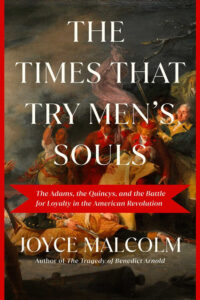BOOK REVIEW: The Times That Try Men’s Souls: The Adams, the Quincys, and the Battle for Loyalty in the American Revolution by Joyce Lee Malcolm. (New York, NY: Pegasus Books, 2023)
“All wars are dangerous and painful . . . But the very worst war, that can sever family relationships and bonds of friendship, that touches even those of no fixed opinion, is a civil war. The American Revolution was one such war.” (page ix)
 The above passage from Joyce Lee Malcolm’s new book, The Times That Try Men’s Souls: The Adams, the Quincys, and the Battle for Loyalty in the American Revolution, makes it very clear that the American Revolution was an especially heart-wrenching situation, with family members turning against each other in a political atmosphere that no one ever expected or whose outcome could be predicted. The question of loyalties and taking sides was well-documented within one family in particular: the Quincys of Massachusetts. Members of this family worked against each other to either support the Boston rebels or the officials of the Crown. The book’s opening “shot” is of one of the Quincys making the sad decision to leave his family, including his ardent Patriot wife and children, and going into exile in England. Even one of his closest friends, John Adams, regretted the decision to flee.
The above passage from Joyce Lee Malcolm’s new book, The Times That Try Men’s Souls: The Adams, the Quincys, and the Battle for Loyalty in the American Revolution, makes it very clear that the American Revolution was an especially heart-wrenching situation, with family members turning against each other in a political atmosphere that no one ever expected or whose outcome could be predicted. The question of loyalties and taking sides was well-documented within one family in particular: the Quincys of Massachusetts. Members of this family worked against each other to either support the Boston rebels or the officials of the Crown. The book’s opening “shot” is of one of the Quincys making the sad decision to leave his family, including his ardent Patriot wife and children, and going into exile in England. Even one of his closest friends, John Adams, regretted the decision to flee.
The Quincy family’s beginnings in Massachusetts are explored first, going back to the time of the Glorious Revolution. The family at the center of this story included the father Josiah, his daughter Hannah, and two sons: Josiah Jr. and Samuel. Hannah was betrothed to an abusive husband, whose brother would later become one of Washington’s major generals (Benjamin Lincoln). Samuel went to Harvard and was later admitted to the bar the same year as his Harvard classmate, John Adams. Things were going well for the family until the Stamp Act and Townshend Acts, when Josiah Jr. made a name for himself by writing political essays criticizing the policies of Parliament. Malcolm gives brief descriptions of the tax policies, how they came about, and the reactions of the Boston populace.
A great deal of attention is given to the trials of the British soldiers involved with the Boston Massacre in March 1770. John Adams and Josiah Quincy, Jr. were chosen to lead the defense of the soldiers, while Samuel Quincy became the prosecutor. Ironically, Adams and Josiah Quincy, Jr. were active members of the Sons of Liberty, and Samuel Quincy believed in submitting to British laws. Josiah Jr. was later selected to travel to the other colonies, starting in South Carolina and moving north, to find out what their feelings were concerning the actions of the King and Parliament. Thomas Hutchinson, James Otis, King George III, and Benjamin Franklin figure prominently in the fast-paced narrative of the Imperial Crisis.
The destruction of the tea in Boston Harbor in December 1773 and Parliament’s reaction with the Coercive Acts further divided members of the Quincy family. Samuel felt that his duty was to the Crown, while his brother wrote a political essay attacking the legality of the Boston Port Act. Josiah Jr. sailed to Great Britian to try to talk to people who were more moderate in their views towards the rebellious colonists. Sadly, the war began in Massachusetts at Lexington and Concord in April 1775, and Josiah died on his return to Massachusetts shortly afterwards. Once the war began, Boston was inundated with loyalists from other parts of New England who believed that they would be safe in the city with British troops. Samuel Quincy and Massachusetts Attorney-General Jonathan Sewell, another associate of John Adams, felt that they had no choice but to leave their homes and escape to London.
Malcolm gives the loyalists in exile in England some often-ignored attention, explaining the choices that they had to make in their unique and unpredictable situation. After chapters that cover the familiar battles of the war, such as Trenton, Saratoga and Yorktown, the book concludes with a brief synopsis of what happened to some of the loyalists after the Revolution, including Samuel Quincy, Samuel Curwin, Jonathan Sewell, Thomas Hutchinson, and William Franklin. Several wanted to return to America, not sure if they would be welcomed by their now-hostile neighbors.
The Times That Try Men’s Souls is an excellent overview of both the major events of the Revolution’s beginning and the difficult choices that members of one particular family were forced to face. Malcolm’s book brings the plight of the loyalists back into the Revolution’s narrative.
PLEASE CONSIDER PURCHASING THIS BOOK FROM AMAZON IN HARDCOVER or KINDLE. (As an Amazon Associate, JAR earns from qualifying purchases. This helps toward providing our content free of charge.)






Recent Articles
The American Princeps Civitatis: Precedent and Protocol in the Washingtonian Republic
Thomas Nelson of Yorktown, Virginia
The Course of Human Events
Recent Comments
"General Israel Putnam: Reputation..."
Gene, see John Bell’s exhaustive Analysis, “Who Said ‘Don’t Fire Till You...
"The Deadliest Seconds of..."
Ed, yes Matlack's son was reportedly a midshipman on the Randolph. That...
"The Whale-boat Men of..."
From my research the British Navy kept a very regular schedule across...